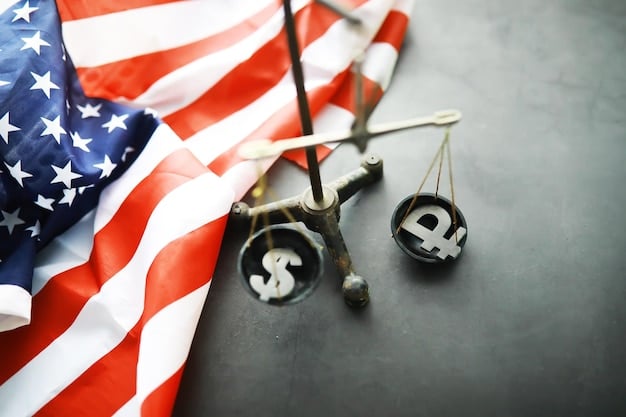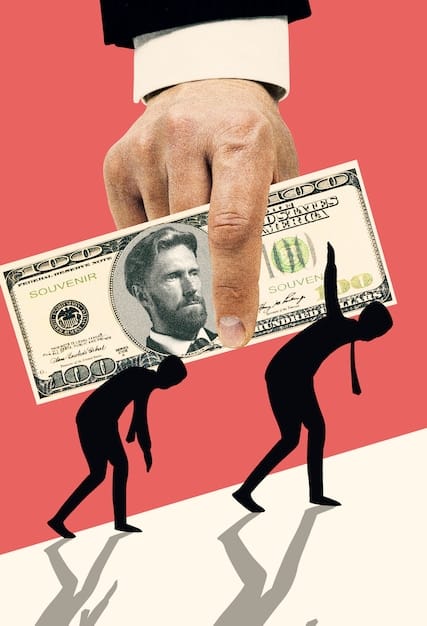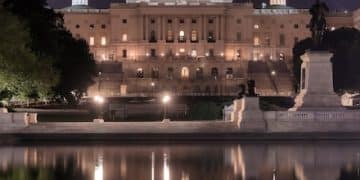Campaign Finance Regulations: Impact on 2026 Midterms

Updated campaign finance regulations are poised to significantly reshape the landscape of the 2026 midterm elections in the US, influencing fundraising strategies, campaign messaging, and the overall competitiveness of races.
The impending 2026 midterm elections are already generating buzz, but a key factor that could dramatically alter the political landscape is the updated campaign finance regulations. Understanding how will the updated campaign finance regulations impact the 2026 midterm elections is crucial for candidates, parties, and voters alike.
The Current State of Campaign Finance Regulations
Campaign finance regulations in the United States are a complex web of laws designed to regulate the raising and spending of money in political campaigns. These regulations seek to promote transparency, prevent corruption, and ensure a level playing field for all candidates.
Key Federal Laws
Several federal laws form the backbone of campaign finance regulation. The Federal Election Campaign Act (FECA) of 1971, and its subsequent amendments, established the basic framework for regulating federal elections. This act introduced disclosure requirements for campaign donations and expenditures and established the Federal Election Commission (FEC) to enforce these regulations.
The Bipartisan Campaign Reform Act (BCRA) of 2002, also known as McCain-Feingold, further amended FECA. BCRA aimed to reduce the influence of soft money (unregulated donations to political parties) and prohibited corporations and unions from using general treasury funds for electioneering communications within 30 days of a primary or 60 days of a general election.
Loopholes and Challenges
Despite these regulations, loopholes and challenges persist. The rise of Super PACs and 501(c)(4) organizations has allowed for significant amounts of money to flow into elections without the same disclosure requirements as traditional campaign committees. These groups can raise and spend unlimited amounts of money, as long as they do not directly coordinate with candidates.
- Dark money contributions remain a significant concern.
- The FEC’s enforcement capabilities have been hampered by partisan gridlock.
- Legal challenges continue to test the boundaries of campaign finance law.
In conclusion, the current state of campaign finance regulations is characterized by a complex framework with ongoing challenges and loopholes. Addressing these challenges will be crucial for maintaining the integrity of elections.
Overview of the Updated Regulations
The updated campaign finance regulations aim to address some of the existing loopholes and challenges within the current system. These changes reflect a growing concern about the influence of money in politics and a desire to create a more equitable electoral environment.
Key Changes Implemented
Several key changes have been implemented in the updated regulations. One significant alteration involves tightening the rules around Super PACs and 501(c)(4) organizations. The new regulations seek to clarify what constitutes “coordination” between these groups and candidates, with stricter definitions to prevent indirect support.
Another notable change is increased disclosure requirements for online political advertising. Recognizing the growing importance of digital campaigning, the updated regulations mandate that online platforms disclose who is paying for political ads, how much they are spending, and who the ads are targeting.
Rationale Behind the Updates
The rationale behind these updates is to enhance transparency and accountability in campaign finance. Proponents of the changes argue that they are necessary to reduce the influence of wealthy donors and special interests, and to ensure that voters have access to information about who is funding political campaigns.

- The updates aim to level the playing field for candidates from diverse backgrounds.
- Increased transparency is expected to deter illicit financial activities.
- The new regulations seek to address the evolving landscape of campaign finance in the digital age.
In conclusion, the updated regulations represent an effort to adapt campaign finance laws to the realities of modern elections. By closing loopholes and increasing transparency, policymakers hope to restore public trust in the democratic process.
Potential Impacts on Fundraising
The updated campaign finance regulations are expected to have a significant impact on how candidates and parties raise money. These changes could alter traditional fundraising strategies and create new opportunities for smaller campaigns.
Shifts in Fundraising Strategies
One potential shift is a greater emphasis on small-dollar donations. With stricter rules on large contributions from Super PACs and wealthy donors, campaigns may need to focus more on grassroots fundraising efforts. This could involve online fundraising platforms, direct mail appeals, and community events.
Another likely change is increased scrutiny of fundraising activities. Candidates and parties will need to be more careful about how they solicit and accept donations, ensuring compliance with the updated regulations. This could lead to higher compliance costs and a greater reliance on legal counsel.
Advantages and Disadvantages for Different Candidates
The updated regulations may create both advantages and disadvantages for different types of candidates. Incumbents with established fundraising networks may find it easier to adapt to the new rules, while challengers may struggle to compete without access to large contributions.
However, the emphasis on small-dollar donations could also benefit grassroots candidates with strong local support. These candidates may be able to raise enough money through online platforms and community events to mount a competitive campaign.
- Incumbents have existing fundraising advantages.
- Challengers may need to rely more on grassroots support.
- Small-dollar donations could play a more significant role.
Ultimately, the impact on fundraising will depend on how effectively candidates and parties adapt to the updated regulations, and whether they can find innovative ways to raise money in the new environment.
Effects on Campaign Messaging
The updated campaign finance regulations are also likely to influence campaign messaging. With increased disclosure requirements and stricter rules on coordination, candidates and parties may need to adjust how they communicate with voters.
Changes in Advertising Strategies
One potential change is a shift away from negative advertising. With increased scrutiny of campaign spending, candidates may be less willing to invest in attack ads that could draw negative attention. Instead, they may focus on promoting their own qualifications and policy positions.
Another possible change is greater emphasis on issue-based advertising. Candidates may seek to engage voters on specific policy issues, rather than relying on broad appeals or personal attacks. This could lead to more substantive debates and a more informed electorate.
Impact on Political Discourse
The updated regulations could also have a broader impact on political discourse. By reducing the influence of money in politics, they may encourage a more civil and productive dialogue between candidates and voters.

However, some critics argue that the regulations could also stifle free speech. They contend that restricting campaign spending could limit the ability of candidates and parties to communicate their messages to voters.
- Candidates may focus on their own qualifications.
- Issue-based advertising could become more prominent.
- Political discourse may become more civil and productive.
In conclusion, the effects on campaign messaging will depend on how candidates and parties respond to the updated regulations, and whether they can find effective ways to communicate with voters in the new environment.
The Role of Independent Expenditures
Independent expenditures, or spending by outside groups that is not coordinated with candidates, play a significant role in campaign finance. The updated regulations seek to address some of the concerns surrounding independent expenditures, particularly those made by Super PACs and 501(c)(4) organizations.
Super PACs and 501(c)(4) Organizations
Super PACs and 501(c)(4) organizations can raise and spend unlimited amounts of money to support or oppose candidates, as long as they do not directly coordinate with the candidates. The updated regulations aim to clarify what constitutes “coordination,” with stricter definitions to prevent indirect support.
One potential change is greater scrutiny of the activities of these groups. The FEC may increase its enforcement efforts, and courts may be more willing to uphold regulations that restrict independent expenditures.
Legal Challenges and the First Amendment
However, legal challenges to the updated regulations are likely. Critics argue that restrictions on independent expenditures violate the First Amendment rights of free speech and association. Courts may need to balance these rights against the need to prevent corruption and maintain the integrity of elections.
The outcome of these legal challenges will have a significant impact on the role of independent expenditures in future elections. If the regulations are upheld, they could significantly reduce the influence of outside groups in political campaigns. If they are struck down, independent expenditures could continue to play a dominant role.
Ultimately, the role of independent expenditures will depend on the legal and political landscape surrounding campaign finance regulation. Policymakers, courts, and candidates will all play a role in shaping the future of independent spending in elections.
Predictions for the 2026 Midterm Elections
Given the updated campaign finance regulations, several predictions can be made about the 2026 midterm elections. These predictions are based on the potential impacts of the regulations on fundraising, campaign messaging, and the role of independent expenditures.
Potential Outcomes and Scenarios
One potential outcome is a more competitive electoral environment. With stricter rules on large contributions and increased transparency, smaller campaigns may have a better chance of competing against established candidates. This could lead to closer races and more unpredictable outcomes.
Another possible scenario is a shift in the balance of power between the major parties. If one party is better able to adapt to the updated regulations, it may gain a fundraising advantage that could translate into electoral success.
Long-Term Implications for Campaign Finance
The 2026 midterm elections could also have long-term implications for campaign finance regulation. If the updated regulations are successful in reducing the influence of money in politics, they could pave the way for further reforms.
- Increased competition among candidates.
- Potential shifts in party power.
- Long-term reforms in campaign finance.
However, if the regulations are ineffective or struck down by the courts, it could reinforce the status quo and lead to even greater concentration of money in elections.
In conclusion, the 2026 midterm elections will be a crucial test of the updated campaign finance regulations. The results of these elections will shape the future of campaign finance and the role of money in American politics.
| Key Point | Brief Description |
|---|---|
| 💰 Fundraising Shifts | Greater emphasis on small-dollar donations and scrutiny of fundraising activities. |
| 📢 Campaign Messaging Changes | Potential shift away from negative advertising and a greater emphasis on issue-based ads. |
| ⚖️ Independent Expenditures | Increased scrutiny of Super PACs and 501(c)(4) organizations. |
| 🗳️ Electoral Outcomes | Potential for more competitive races and shifts in the balance of power. |
FAQ
▼
The updated regulations include stricter rules on Super PACs, increased disclosure requirements for online political ads, and clarified definitions of coordination to prevent indirect candidate support.
▼
Campaigns may shift towards small-dollar donations and grassroots fundraising efforts, with increased scrutiny of fundraising activities to ensure compliance with the new rules.
▼
There could be a move away from negative advertising, with more emphasis on issue-based campaigns and candidates’ qualifications, leading to more civil political discourse.
▼
The updated regulations seek to increase scrutiny of Super PACs and 501(c)(4) organizations, clarifying what constitutes coordination in order to prevent indirect support of candidates.
▼
The 2026 elections might see a more competitive environment, potential shifts in party power, and could pave the way for long-term reforms in campaign finance regulations.
Conclusion
In conclusion, the updated campaign finance regulations are poised to significantly impact the 2026 midterm elections by reshaping fundraising strategies, campaign messaging, and the overall competitiveness of races. As candidates, parties, and voters navigate these changes, the 2026 elections will serve as a crucial test of the regulations’ effectiveness and their long-term implications for American politics.





